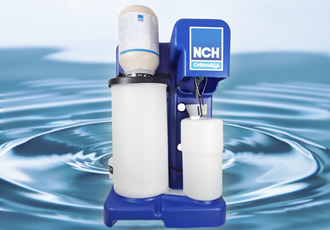Oxidize your world

Chem-Aqua has launched a range of oxidative technologies, consisting of oxidizing biocides, specially formulated for water treatment in most industrial, commercial and hospitality applications. These include food and beverage, plastics, general manufacturing and any type of building with a cooling tower or water tank. The new oxidative technologies range will eliminate microbiological slimes, which could otherwise result in corrosion or provide an environment that can harbour Legionella.
Designed as part of Chem-Aqua's water treatment solutions and services range, NCH's oxidative programmesare tailored to meet exactly the individual needs of the customer, based on the type of biocide required, levels of pH and organic loading on the system. Customers are then given a range of options to choose from.
The new range of oxidative technologies is available in multiple formats including traditional liquids, solid pastes, tablets, powders and granules. Dosing equipment for the solid option includes traditional brominators and, more excitingly, a new range of Handifeeders designed for automatic delivery of the chemical.
"By having a range of chemistries and technological application methods we aim to be able to prescribe the correct chemistry for any prevailing problem," explained Brian Booth VP of NCH Europe's Water Treatment Innovation Platform. "If, for example, the heat exchanger in a dairy plant's cooling system fails, the pressure balance means it's quite easy for the milk to breach the heat exchanger and end up in the cooling tower.
"Similarly, in the steel industry where water is directly used to quench molten steel, small amounts of oil and slag can contaminate the water coolant. In these circumstances typical oxidizing biocides such as Sodium Hypochlorite (chlorine) could become ineffective and options like Chlorine Dioxide may be more appropriate.
"Over time, these process contaminants can lead to sludge build-up in remote, low flow areas of the piping system and help to feed the organic growth of bacteria such as Legionella. This can lead to down-time, higher costs and potentially microbiological induced corrosion (MIC)."
For enhanced control of water treatment, NCH's customers can use reduction oxidation potential (redox) probes as part of their oxidative biocide programme. As the redox voltage falls, the system can be designed to automatically operate a pump, valve combination, or both, to start dosing. It can continue to dose chemical until a pre-set upper voltage is attained at which point it would shut-off dosing.
Alternatively, specific ion-selective electrodes (ISEs) can be used as opposed to a general redox probe to record the presence of the specific chemical. Digital readings from the controllers can be accessed remotely by engineers and plant managers for easy diagnostics and production management.
Similar articles
More from NCH Europe
- Prioritise lubrication so you don't burn baby burn! 29th January 2018
- There's a light at the end of the fatberg tunnel 17th August 2017
- Biofilms: They’ll leave you hot under the collar 15th August 2017
- We need to address the need for better metallurgy education 27th July 2017












Write a comment
No comments